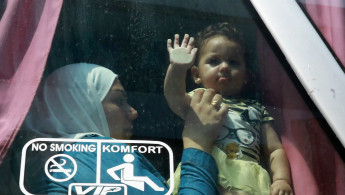UN urges Syrian regime to grant it full access to returnees
The UN on Saturday urged the Syrian regime to give it access to all areas of the country to follow up on the return of refugees.
The chief of the the UN's refugee agency UNHCR said access to some areas of the country was difficult but necessary as Lebanon continues to encourage Syrians to return home despite the ongoing conflict.
"It is very important that in areas of return, organisations like mine... are present," said UNHCR chief Filippo Grandi.
Grandi said that organisations such as the UNHCR must be present to "observe the returns" and help returnees with any problems they may face.
Although tens of thousands of Syrians have returned, according to the Lebanese authorities, human rights groups and many Syrians fear returnees could face arrest, conscription into regime forces or death.
"This is the very strong message that I have passed to the Syrian government," he told reporters in neighbouring Lebanon's capital Beirut, after earlier this week undertaking a three-day visit to Syria, reported AFP.
Grandi visited the central provinces of Homs and Hama, but said access to the Damascus countryside had been more difficult.
Without full access to the UN and other humanitarian organisations, "there is an element of confidence that is missing" among potential returnees, Grandi said.
Refugees living in camps in Lebanon are also wary of returning home due to high unemployment and poor basic services, as well as continued fighting on several fronts.
Many of the 1.5 million Syrians in Lebanon may also find themselves with no home to return to, as persistent bombardment by Syrian regime forces and their Russian allies has seen thousands of homes destroyed over the eight-year war.
For young men above 18 years old, the chief fear is that they will be conscripted into President Bashar al-Assad's army.
Damascus has said it will allow returnees a grace period of six months before they are drafted.
But "there's been a few cases where this, in our opinion, had not been respected... and we have reported" it to the regime, Grandi said.
"In some places we are not [present], so we cannot raise this issue," he said.
Today, Assad's regime controls almost two-thirds of the country, after expelling rebels and jihadists from large swathes of territory with military support from Russia since 2015. The country's northern provinces are controlled by a mixture of Turkey-backed rebels, jihadist groups and Kurdish forces.
The Kurdish-led Syrian Democratic Forces (SDF) are currently leading their final battle to rid the country of its last Islamic State group-held stronghold in eastern Syria.
The war, which enters its ninth year this month, has killed more than 360,000 and displaced millions at home and abroad.





 Follow the Middle East's top stories in English at The New Arab on Google News
Follow the Middle East's top stories in English at The New Arab on Google News


![22 Arab countries at COP29 have rejected the targeting of fossil fuels [Getty]](/sites/default/files/styles/image_330x185/public/2024-11/GettyImages-2184289638.jpg?h=199d8c1f&itok=ptHl5bec)